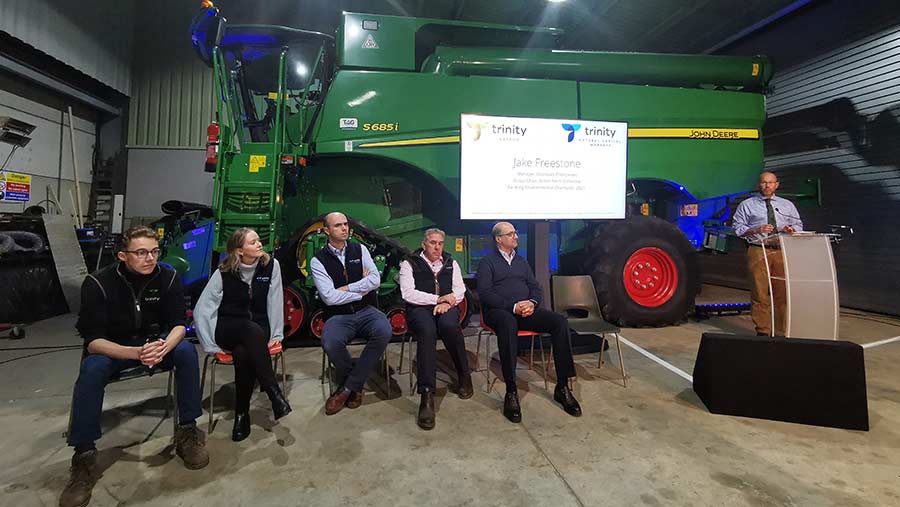UK’s first online natural capital trading platform launched
 Jake Freestone, right, addresses the Trinity NCM launch © MAG/Philip Case
Jake Freestone, right, addresses the Trinity NCM launch © MAG/Philip Case Regenerative farmers say the UK’s first natural capital trading platform offers a new and exciting, long-term income stream as Basic Payment Scheme (BPS) payments are gradually phased out.
Trinity Natural Capital Markets (NCM) allows farmers of all sizes and enterprises to generate and sell carbon credits on an online trading platform to domestic and global companies wanting to offset their emissions.
Trinity AgTech has created the digital platform, known as “Sandy”, which is used to calculate agricultural carbon credits and biodiversity tokens on farmland to then sell at its online marketplace.
See also: 6 companies offering carbon-based payments to arable farmers
From early November, Trinity NCM will begin two months of calibration and piloting with farmers. The carbon credits trading platform will then be released for transactions and trading in January 2022.
Interest in emerging markets for carbon and natural capital tied up in farmland has been increasing in recent months.
Trinity NCM says its carbon credits trading platform can help farmers and land managers explore new and untapped revenue streams and “get ahead of the curve” before the launch of the government’s Environmental Land Management scheme.
Official launch
Jake Freestone, the 2021 Farmers Weekly Environmental Champion, invited five fellow regenerative farmers from the Green Farm Collective, and industry stakeholders, to Overbury Farms on the Gloucestershire/Worcestershire border for the official launch of the trading platform on Thursday (14 October).
Scientists from Trinity AgTech demonstrated the science and technology behind the system, which Mr Freestone has been trialling at his 1,590ha arable and sheep farm for the past few months. The event was also streamed live online as part of the Countryside COP initiative.
“This is a prime opportunity to explore and demonstrate the potential our farming systems have got to deliver a different income stream to farmers,” Mr Freestone said. “I think going forward that is going to be vital as an independent source of income.”
Farming systems at Overbury have been evolving around minimal soil disturbance; keeping the soil covered with cover crops; wider, more diverse rotations; and the reintroduction of sheep.
Mr Freestone said this integrated farm management approach was bringing financial benefits with reduced crop inputs. It also delivered reduced carbon emissions which could be monetised through carbon credits.
The partnership with Trinity AgTech will help Overbury Farms to generate a new income stream for the business which is independent of traditional markets and government agri-environment schemes.
“It’s these knock-on things that we never really thought about 8-10 years ago when we started on this journey which are only now coming into fruition where we can actually capture more value to add to our farming business,” Mr Freestone explained.
Tom Allen-Stevens, an Oxfordshire farmer and director of communications and PR at Trinity AgTech, said there was “hardly any recognition nor reward from the marketplace” for the work that he and other farmers did to enhance the environment, but “that is set to change”.
‘Priceless’ natural assets
Essex arable farmer Simon Cowell, who is part of the Green Farm Collective, said he was excited by the prospect of generating a new income stream by trading his carbon credits.
“I have already got the natural capital on my farm,” he said. “There is huge value in grassland and reed beds, woodland, hedges and trees. To me, they are priceless. They have been passed down from generations.
“We love our farms, the way they look, how they are and the nature and everything that’s there. It’s just great that people outside farming might start to appreciate it.”
A number of companies have entered the carbon trading market for agriculture.
Earlier this year, agricultural lawyer Julie Robinson, from Roythornes Solicitors, said farmers should investigate any offers fully before committing to joining a scheme.
NFU adviser Jonathan Scurlock echoed her comments, saying some farmers were keener than others about the prospects of carbon trading.
